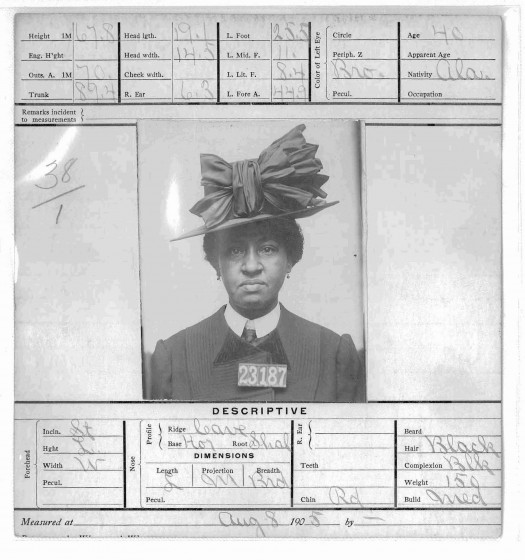It’s been months and I still haven’t watched the video of Laquan McDonald’s execution. I never will. Like a lot of people, I know that he was shot 16 times by officer Jason Van Dyke. I know that he was walking away when he was gunned down. I know that he is dead and that’s enough for me.
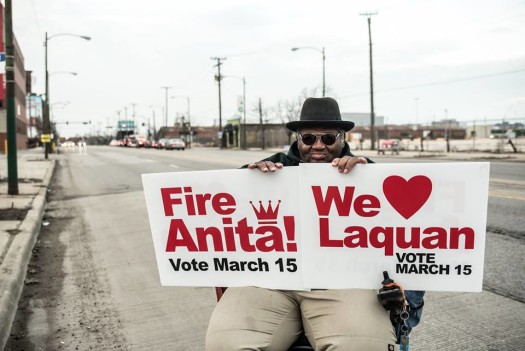
Love and Struggle photos (3/14/16)
I’ve been angry at people since the release of the video last November. My anger has been simmering and unexpressed. I’m hurt that it took this particular video to motivate some people to care about police violence against Black people. I’ve been suffering from a self-diagnosed low grade depression. Lots of things have contributed to this. One of them is despair that Laquan’s death will be adjudicated through a court system that cannot deliver any actual justice. I want to get off the merry-go-round. I want to escape from groundhog day. But I feel strangely trapped, maybe imprisoned by the limits of other people’s imaginations and their demands for ‘justice.’ I don’t want us to fail Laquan like we have Tamir and so many others.
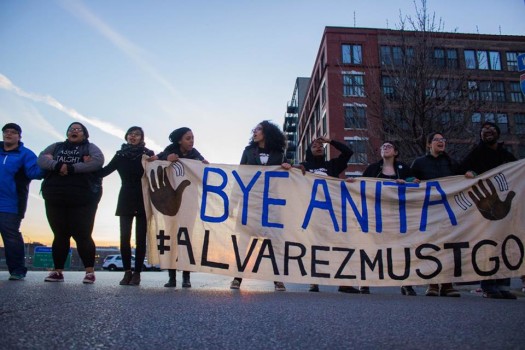
photo by Kaleb Autman (3/10/16)
Over the past few weeks, I’ve spent more time than I’d like to admit directing my strangled anger at Cook County State’s Attorney Anita Alvarez. She waited 400 days before bringing charges against Van Dyke and only did so after a judge mandated the release of the videotape. But the truth is that my antipathy for her dates back years. She is the embodiment of a “tough on crime” prosecutor and I’ve wanted to see her out of office for the past 7 years.
I decided months ago that I would do my part to help defeat Alvarez during the primary. I’ve spent part of that time gently prodding others to join me. A confluence of forces catalyzed by the delayed release of the Laquan McDonald execution video has made it possible that Alvarez might lose the primary today. It’s not a given but it’s possible because a variety of individuals and organizations have worked both autonomously and collectively to educate, incite and mobilize Cook County residents to oust her from office. Some of these individuals and groups are politicians, PACs and unions that have endorsed a particular candidate. But what’s been different about this State’s Attorney contest is that people and groups that don’t usually engage in electoral politics (for various reasons) have joined the effort to unseat Alvarez.
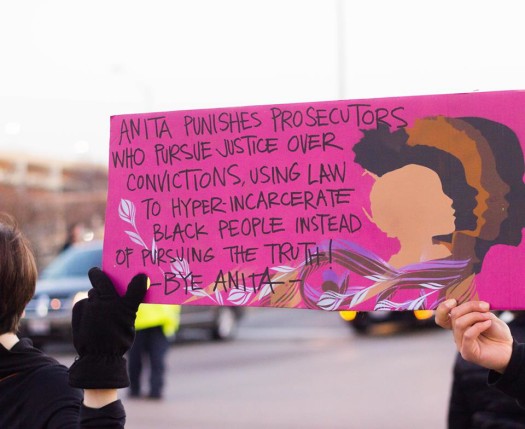
photo by Kaleb Autman (3/10/16)
My friend Kelly Hayes specifically writes about young Black Chicago organizers co-leading a grassroots #ByeAnita campaign in a Truthout article:
“Young Black organizers in Chicago, who have helped claim victories as historic as winning reparations for survivors of police torture and securing a trauma center for Chicago’s underserved South Side, made a decision in the weeks that followed the traumatic release of dashcam footage of Laquan McDonald’s death: They wanted Anita Alvarez out of office.”
The #ByeAnita #AlvarezMustGo campaign of the past few weeks is unique. The lead groups and individuals involved did not work in coordination with any particular candidate or officially endorse one (much to some people’s consternation). Instead groups and individuals organized an outside political education campaign that relied on direct action, teach ins, traditional canvassing and social media. Actions were both autonomous and also strategically planned/coordinated. Four local youth-driven groups, Assata’s Daughters, Black Youth Project 100 (BYP100), Fearless Leading by the Youth (FLY) and Black Lives Matter Chicago (BLM Chi), planned and executed over a dozen direct actions in less than a month.
Again Kelly offers valuable context about these direct actions:
“With a budget of less than $1,000 scraped together for their efforts, the coalition of grassroots groups and organizers has staged more than a dozen actions in the last month.
These tactics, aimed at keeping grievances against Alvarez from falling from the public’s mind before Election Day, helped keep the record of the embattled state’s attorney in the spotlight, but according to Morris Moore, the campaign has also provided other benefits to its architects.
“In the beginning, the Bye Anita campaign felt like harm reduction, and like therapy in a sense,” said Morris Moore, noting that “Anita Alvarez was involved in a horrible tragedy that is still being felt in the Black community by young Black people. And even if the mainstream media isn’t paying attention to it anymore, we’re still feeling it.” But by bringing direct action to the campaign trail, and consistently ambushing their politically vulnerable target, Morris Moore says she found something that she needed in this political moment. “These actions have allowed me to recreate a way to be involved in politics,” she said. “I don’t have to support a candidate. I can say I don’t support this candidate, and this is why.”
Veronica Morris Moore gives voice to a different form of engagement that has in some ways provided a catharsis for a community of exhausted and depleted organizers. I include myself among those organizers. While I am tired from working to defeat Alvarez while managing all of my other work and life commitments, I have found inspiration in the persistence, commitment and creativity of younger organizers.
Yesterday, for example, members of Assata’s Daughters supported by allies staged an ambitious action across the city. They created and then unfurled 16 banners in communities across Chicago. As reported in Chicagoist:
“Blood on the ballot,” reads one banner hanging over the Kennedy Expressway at Irving Park. “Justice for Rekia, no votes for Anita, reads another hung over the Nicholas Bridge of the Art Institute of Chicago. “#AdiosAnita 16 shots and a cover up,” reads another on Western Avenue near 18th Street.”
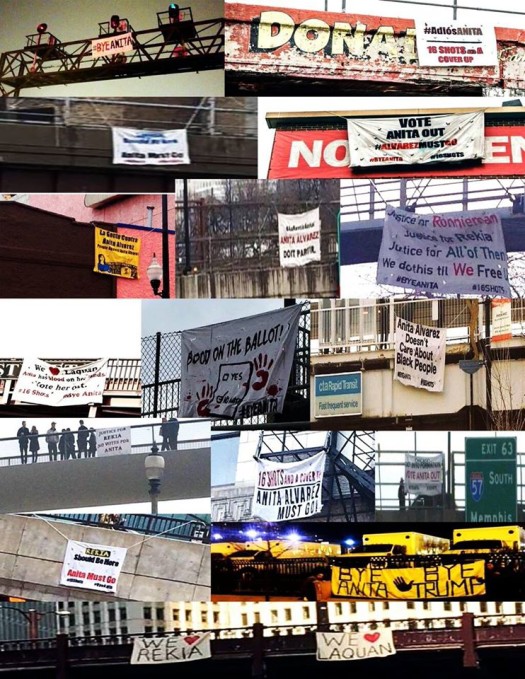
photo collage by Monica Trinidad (3/14/16)
In a statement, Assata’s Daughters explained the rationale for the action:
“Final voter engagement before the March 15th Primary in Chicago is taking to the sky today as airplanes are set to fly with banners highlighting the link between Hillary Clinton to the unpopular Rahm Emanuel and the state’s attorney, Anita Alvarez, with whom he covered up Laquan McDonald’s murder during his own re-election campaign. This is one of a series of 16 banners that will be released throughout the city all pushing the messaging that Anita Alvarez must go.”
Unfortunately the weather didn’t allow for the planes to fly the banner so they will try again today. However, the group did successfully drop all 16 banners across Chicago. I’m trying to keep the images of those 16 banners in my mind to replace the echoes of the 16 shots that continue to reverberate loudly in our community. And if Alvarez is defeated tonight, I’ll take a deep breath and pray that some of the despair I’ve been feeling about Laquan will dissipate. I’ll hope that Laquan is resting a bit easier. I’ll whisper words of gratitude for all of those whose efforts will have made her defeat a reality. I won’t confuse Alvarez’s defeat with systemic transformation. I’ll go back to work to abolish prisons, police and surveillance and to build a world that doesn’t need them. But I will do so satisfied that our collective action removed an awful elected official from office and that we now have more space to create the world in which we hope to thrive.
There are more components of the #ByeAnita campaign and many others (including me) who’ve been involved at various levels but that’s a story for another day. For today, I want to lift up the efforts, labor and leadership of the young Black Queer women and femmes who have planned and executed the bulk of the #ByeAnita campaign direct actions. They have been the life-blood of this campaign. I offer my appreciation and my love. I hope that anyone reading this who can vote in Cook County will use their ballot to say #ByeAnita in Laquan’s name.




